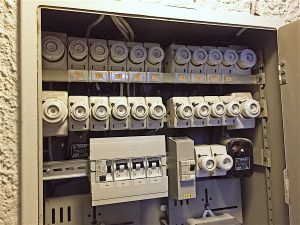
The months with the most electrical fires are December and January due to increased use of heating appliances and lights. Most electrical fires start in the bedroom, but the highest number of fatalities occur with fires located in the living room, family room and den.
Some electrical fires happen because of problems in house wiring or appliance failure, but many occur due to mistakes that homeowners make like overloading electrical outlets or extension cords.
When working with members of your community on fire and life safety, it is important to teach the common causes of electrical fires. Here are the 5 most common causes of electrical fires.
1. Faulty outlets, appliances
Most electrical fires are caused by faulty electrical outlets and old, outdated appliances. Other fires are started by faults in appliance cords, receptacles and switches. Never use an appliance with a worn or frayed cord which can send heat onto combustible surfaces like floors, curtains, and rugs that can start a fire.
Running cords under rugs is another cause of electrical fires. Removing the grounding plug from a cord so it can be used in a two-prong electrical outlet can also cause a fire. The reason appliances have the extra prong is so they can be only used in outlets that can handle the extra amount of electricity that these appliances draw.
2. Light fixtures
Light fixtures, lamps and light bulbs are another common reason for electrical fires. Installing a bulb with a wattage that is too high for the lamps and light fixtures is a leading cause of electrical fires. Always check the maximum recommended bulb wattage on any lighting fixture or lamp and never go over the recommended amount.
Another cause of fire is placing materials like cloth or paper over a lampshade. The material heats up and ignites, causing a fire. Faulty lamps and light fixtures also frequently result in fires.
3. Extension cords
Misuse of extension cords is another electrical fire cause. Appliances should be plugged directly into outlet and not plugged into an extension cord for any length of time. Only use extension cords as a temporary measure. If you do not have the appropriate type of outlets for your appliances, hire an electrician to install new ones.
4. Space heaters
Because these types of heaters are portable, many times people put them too close to combustible surfaces such as curtains, beds, clothing, chairs, couches and rugs. Coil space heaters are especially dangerous in this regard because the coils become so hot they will almost instantaneously ignite any nearby flammable surface.
If you do use space heaters, use the radiator-type that diffuse heat over the entire surface of the appliance. These are less likely to ignite flammable items, but should still be kept away from them.
5. Wiring
Outdated wiring often causes electrical fires. If a home is over 20 years old, it may not have the wiring capacity to handle the increased amounts of electrical appliances in today’s average home, such as computers, wide-screen televisions, video and gaming players, microwaves and air conditioners.
Breakers should be triggered when circuits get overloaded by too much electricity, but outdated breaker boxes often have worn connectors that do not work, causing the system to overload and start an electrical fire.
